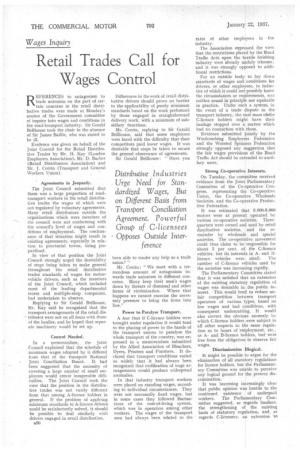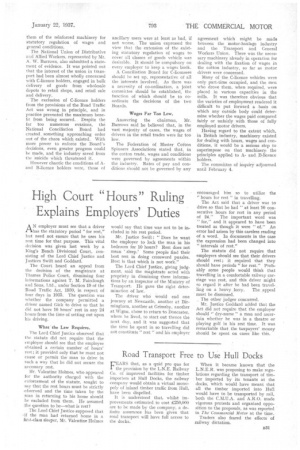Wages Inquiry
Page 40

Page 41

If you've noticed an error in this article please click here to report it so we can fix it.
Retail Trades Call for
Wages Control
REFERENCES to antagonism to trade unionism on the part of certain concerns in the retail distributive trades were made at Monday's session of the Government committee of inquiry into wages and conditions in the road-transport industry. Sir Gerald Bellhouse took the chair in the absence of Sir James Baillie, who was stated to be ill.
. Evidence was given on behalf of the Joint Council for the Retail Distributive Trades by Mr. H. Kay (London Employers Association), Mr. D. Barber (Retail Distributors Association) and Mr. J. Corrin (Transport and General Workers Union).
Agreements in Jeopardy.
The Joint Council submitted that there was a large proportion of roadtransport workers in the retail distributive trades the wages of which were not regulated by voluntary agreements. Many retail distributors outside the organizations which were members of the council were not conforming with the council's level of wages and conditions of employment. The continuance of that situation might result in existing agreements, especially in relation to provincial towns, being jeopardized.
In view of that position the Joint Council strongly urged the desirability of steps being taken to make general throughout the retail distributive trades standards of wages for motorvehicle drivers, such as the members of the Joint Council, which included most of the leading departmental stores and multiple-shop companies, had undertaken to observe.
Replying to Sir Gerald Bellhouse, Mr. Kay said he recognized that the transport arrangements of the retail distributor were not on all fours with those of the haulier, and he hoped that separate machinery would be set up.
Control Needed.
In a memorandum, the Joint Council explained that the schedule of minimum wages adopted by it differed from that of the transport National Joint Conciliation Board. It had been suggested that the necessity of covering a large number of small employers would create insuperable difficulties. The Joint Council took the view that the position in the distributive trades was not vastly different from that among A-licence holders in general. If the problem of applying minimum standards to A-licence drivers could be satisfactorily solved, it should be possible to deal similarly with drivers engaged in retail distribution.
u30 Differences in the work of retail distributive drivers should prove no barrier to the applicability of purely minimum standards based on the work performed by those engaged in straightforward delivery work, with a minimum of subsidiary functions.
Mr. Corrin, replying to Sir Gerald Bellhouse, said that some employers were faced with the difficulty that their competitors paid lower wages. It was desirable that steps be taken to secure the general observance of agreements.
Sir Gerald Bellhouse: "Have you been able to render any help as a trade union?"
Mr. Corrin : "We meet with a tremendous amount of antagonism towards trade unionism in different concerns. Many keep their men's wages down by threats of dismissal and other forms of victimization. Where that happens we cannot exercise the necessary pressure to bring the firms into line."
Power to Paralyse Transport.
A fear that if C-licence holders were brought under regulation it would tend to the placing of power in the hands of the transport unions to paralyse the whole transport of the country, was expressed in a memorandum submitted by the Allied Association of Bleachers, Dyers, Printers and Finishers. It declared that transport conditions varied so widely that it had always been recognized that codification of wage arrangements would produce widespread anomalies.
In that industry transport workers were placed on standing wages, according to individual circumstances. They were not necessarily fixed wages, but in some cases they followed fluctuations of the cost-of-living system, which was in operation among other workers. The wages of the transport men had always been related to the rates of other empl yees in the industry. The Association exprcissed the view that the restrictions placed by the Road Traffic Acts upon the textile finishing industry were already unduly irksome, and it was strongly opiosed to additional restrictions.
For an outside body to lay down standards of wages anciconditions for drivers, or other emplo Tes, in industies of which it could no possibly know the circumstances or requirements, was neither sound in principl nor equitable in practice. Under suci a system, in the event of a trade dispute in the transport industry, the viast mass of.the C-licence holders might have their haulage stopped over a matter which had no connection with them.
Evidence submitted ointly •by the Woolcombing Employers Federation and the Worsted Spinners Federation strongly opposed any suggestion that the fair wages provisions of the Road Traffic Act should be exiended to ancillary users.
Strong Co-operativa Interests.
On Tuesday, the cominittee received evidence from the Jointl Parliamentary Committee of the Co-Operative Congress, representing the Co-operative Union, the Co-operative Wholesale Societies, and the Co-op rative Productive Federation.
It was estimated that 8,000-9,00(1 motors were at present operated by various co-operative societies. Threequarters were owned an used by retail distributive societies, and the remainder by wholesale and special societies. The co-operative movement could thus claim to be responsible for about 2 per cent, of the C-licence vehicles, but its interests in Aand Blicence vehicles were small. The number of C-licence vehicles used by the societies was increasing rapidly.
The Parliamentary Committee stated that it was satisfied that an extension of the existing statutory regulation of wages was desirable in the public interest. This would tend to reduce unfair competition betWeen transport operators of various types, based on low wages and bad cOnditions, with consequent undercuttihg. It would also correct the obvious anomaly by which C-licence holders were subject in all other respects to the same regulation as to hours of ernployment, etc., as Aand B-licence holders, but were free from the obligation to observe fair wages.
Discrimination Illogical.
It might be possible to argue for the elimination of all statutory regulations for licence holders, but the Parliamentary Committee was unable to perceive any logical ground for the present discrimination.
It was becoming inbreasingly clear that public opinion win hostile to the continued existence of underpaid workers. The Parliamentary Committee suggested, as re, gards hauliers. the strengthening of the existing basis of statutory regulation, and, as regards C-licensecs, ai extension to them of the reinforced machinery for statutory regulation of wages and general conditions.
The National Union of Distributive and Allied Workers, represented by Mr. A. W. Burrows, also submitted a statement of evidence. It was pointed out that -the interest of the union in transport had been almost wholly concerned with C-licence holders, engaged in bulk delivery of goods from wholesale depots to retail shops, and retail sale and delivery.
The exclusion of C-licence holders from the provisions of the Road Traffic Act was wrong in principle, and in practice prevented the maximum benefit from being secured. Despite the far too numerous evasions, the National Conciliation Board had created something approaching order out of the chaos which existed. With more power to enforce the Board's decisions, even greater progress could be made, and the industry saved from the suicide which threatened it.
However chaotic the conditions of Aand B-licence holders were, "those of ancillary users were at least as had, if not worse. The union expressed the view that the extension of the existing statutory regulation of wages to cover all classes of goods vehicle was desirable. It should be compulsory on every employer to keep a wages book.
A Conciliation Board for C-licensees should he set up, representative of all the interests involved. As there was a necessity of co-ordination, a joint committee should be established, the function of which should be to coordinate the decisions of the two Boards.
Wages Far Too Low.
Answering the chairman, Mr. Burrows said he believed that, in the vast majority of cases, the wages of drivers in the retail trades were far too
low.Federation of Master Cotton T he
Spinners Associations stated that, in the cotton trade, wages and conditions were governed by agreements within the industry. Rates of pay and conditions should not be governed by any agreement which might be made between the motor-haulage industry and the Transport and General Workers Union. There was the necessary machinery already in operation for dealing with the fixation of wages in the cotton industry, so far as motor drivers were concerned.
Many of the C-licence vehicles were only part-time occupied, and the men who drove them, when required, were placed in various capacities in the mills. It was therefore obvious that the varieties of employment rendered it difficult to put forward a basis on which any outside body could determine whether the wages paid compared fairly or unfairly with those of fully employed motor drivers.
Having regard to the extent which, in British industry, machinery existed for dealing with hours, wages and conditions, it would be a serious step to superimpose on that machinery, the principles applied to Aand B-licence holders.
The committee of inquiry adjourned until February 4.
















































































































